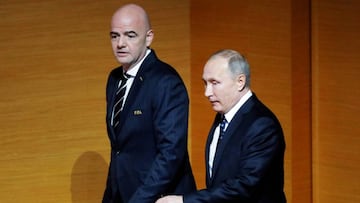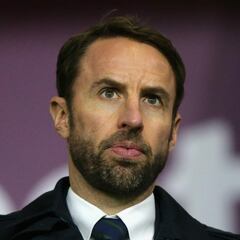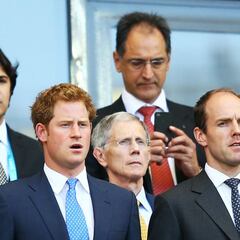Fifa in state of panic over calls to boycott Russia World Cup
Vladimir Putin could face a comprehensive diplomatic snub at the opening game. "Tensions have reached breaking point," officials admit.

Fifa is in a state of panic over growing international calls for a World Cup boycott. Publicly, world football's governing body has remained silent, but high-ranking officials are privately acknowledging that "the poisoning of Sergei Skripal has been the straw that broke the camel's back. Tensions have reached breaking point." Certainly, the opening game between Russia and Saudi Arabia, both countries under fierce scrutiny from the rest, could well be the scene of an all-out diplomatic cold shoulder. The British, who have confirmed that no dignitaries will be in Russia, have begun conversations with their western allies with a view to leaving Vladimir Putin sitting in an empty Luzhniki Stadium royal box at the opening ceremony on 14 June. The United States supports such a measure.
"How can we go to Putin's World Cup now?"
The UK government has concluded that it is "highly likely" that Russia is responsible for the nerve-agent attack on former spy Skripal and his daughter, Yulia, in Salisbury, in southern England. Its prime minister, Theresa May, has stated: "Either this was a direct act by the Russian state against our country, or the Russian government lost control of this potentially catastrophically damaging nerve agent and allowed it to get into the hands of others." Either way, Russia is behind it. "How can we go to Putin's World Cup now?" the Daily Mail has asked.
The world's other chief superpower, the US, has joined in Britain's protests, spurred on by Russia's alleged cyber-interference in its most recent presidential elections. The fear of voters being influenced by Russian fake news farms and troll armies has spread to countries like Spain and France. As with the poisoning of Skripal, Russia denies the accusations, and challenges those making them to bring forward proof.
Related stories
The conflicts in Ukraine and Sryia and the annexing of the Crimea are further issues that may be added to the great many surrounding Putin, who this Sunday stands for re-election as Russian president. The programme of state-doping, too. On top of that, in another part of the world, the Middle East, Saudi Arabia and its allies' blockade against Qatar, Fifa's partner in the 2022 World Cup, continues. "I wanted the 2018 World Cup to go to Russia and 2022 to go to the United States. That would have kept a global balance, but Nicolas Sarkozy and Michel Platini [then presidents of France and Uefa, respectively,] supported Qatar, and the balance was broken," ex-Fifa chief Sepp Blatter has said, adding further fuel to the fire.
"There is no indication that the tensions are going to ease"
Against this backdrop, there is deep concern at Fifa. More than that: full-on panic. The body's president, Gianni Infantino, is on the other side of the world, in Peru, meeting with the heads of South America's confederations, having been photographed in recent days alongside Putin, playing football at the Kremlin. However, "he is far from indifferent to what's going on, even if he hides it," is the word from Zurich. "There is no indication that the tensions are going to ease; far from it. They look like they'll get worse, and that puts the World Cup at risk." Russia 2018 is set to see a diplomatic snubbing of Putin. But above and beyond that danger is one of outright boycotts from the event, with several nations threatening to pull out.


